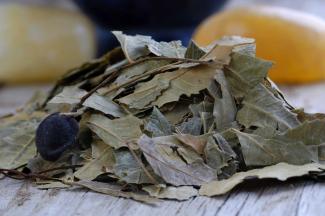Agriculture
Harnessing the potential of Ghana’s green gold
 picture-alliance/blickwinkel/McPHOTO/O. Diez
Neem leaves can be used to obtain an organic pesticide.
picture-alliance/blickwinkel/McPHOTO/O. Diez
Neem leaves can be used to obtain an organic pesticide.
Harvesting and preparing the crop for storage is an arduous task. When this work is drawing to a close, farmers usually take a break.
For Nora Achiligabe, the work continues. Picking, cleaning and packing the seeds of the neem tree for sale will be her main off-season occupation. “I am paid 180 Cedi – almost $ 15 – for every 50 kilogrammes, because my seeds are always clean. With the income from this project, we can ensure that we have enough to eat and cover the basic needs of our household,” she says. “My highest consignment was 459 bags, which amounted to 82,620 Cedi, around $ 6700. It is good business.”
Achiligabe is a mother of four who lives in Sahanayili, a community in the Nanton District of the Northern Region of Ghana. Nearly 60 % of rural Ghanaian women are employed as farmers, according to the UN Food and Agriculture Organization (FAO).
“Trading in neem seeds in the last two and a half years has solved many financial issues in my family. Maize and soy yields from our farm have reduced. This has had an impact on our food security, but the income from this new trade supplements the little we harvest,” Achiligabe says. A World Bank Group Country Climate and Development Report confirms that long periods of drought, flooding and rising temperatures as a result of the climate crisis are affecting yields in Ghana.
Achiligabe is just one of over 581 women in three cooperatives spread throughout the Northern, Upper East and West Regions supplying neem seeds to Ghanaian agribusiness ventures.
Organic pesticides and fertilisers
Kingsworth Farms in Ghana’s capital Accra is one of the companies that uses neem seeds to produce organic pesticides and fertilisers. Their products are in high demand locally and internationally. Neem has an essential active property called azadirachtin, which makes it an organic insecticide, fungicide and miticide.
Research studies on the efficacy of neem show that biopesticides are promising and could be used as part of an integrated pest-management strategy for many crops, including chilli peppers. Scientists at the University of Ghana have also proved that neem-seed extract is effective for controlling the diamondback moth, which attacks cabbage. It kills other crop pests too, including armyworms, aphids, whiteflies and fungus gnats.
Kingsworth Farms began as a small company three years ago. It has since gone through the regulatory process and received approval from all government authorities to produce and sell the biopesticide.
“We are currently one of the biggest factories in the country, with a production capacity of three tonnes per day. It is our medium-term plan to increase to 18 tonnes and expand marketing outlets to neighbouring countries and abroad to provide decent work, especially for women,” says James Quartey, the company’s Chief Executive.
To ensure sustainability of supply, the company has cultivated 600 hectares of neem seedlings on degraded land at Dadieso, in the western part of Ghana, and is preparing to replant about 2000 hectares beginning next year, Quartey reports.
The cost of chemical pesticides
Biopesticides are urgently needed. Copperfield Banini, Deputy Director of the Pest and Disease Control Department of Ghana’s Plant Protection and Regulatory Services Directorate (PPRSD), fears that the rise in temperature due to global heating will create a favourable atmosphere for pests and diseases. This would encourage the use of more chemical pesticides. They can cause massive environmental damage, jeopardise biodiversity and harm human health.
Civil-society organisations are concerned that a majority of farmers in Ghana are reliant on chemical pesticides. Some of the unauthorised pesticides used in Ghana contain active ingredients that are classified as very hazardous by the World Health Organization (WHO) and the European Union (EU) due to the damage they cause to soil, water and biodiversity.
Stakeholders are now encouraging the government and the private sector to invest in research into alternative pest-control methods such as biopesticides.
Climate-smart technology
Ken Okwae Fening, the Sub-regional Coordinator of the African Regional Postgraduate Programme in Insect Science at the University of Ghana, thinks neem products are a solution. Pests cannot easily develop resistance to them as they have multiple mechanisms of action.
Furthermore, even though neem products are not free from side effects, they are considered to be less harmful to some beneficial insects than many synthetic agrochemicals.
Fening supports the idea of growing more neem trees, especially on degraded land, to serve as carbon sinks while providing clean air. “It is the seeds and leaves that are used, leaving the tree intact. It is available, accessible and affordable,” says the agricultural entomologist. “Apart from that, collecting neem seeds is an income-generating activity, especially for women.”
Fening states that the production of agro-inputs from neem seeds is an example of a climate smart technology that will boost crop production, contribute to food safety and serve as an alternative livelihood venture that builds resilience to the climate crisis at the local level.
Albert Oppong-Ansah is a Ghanaian journalist specialising in reporting on environmental and development issues.
ansahalbert@gmail.com


